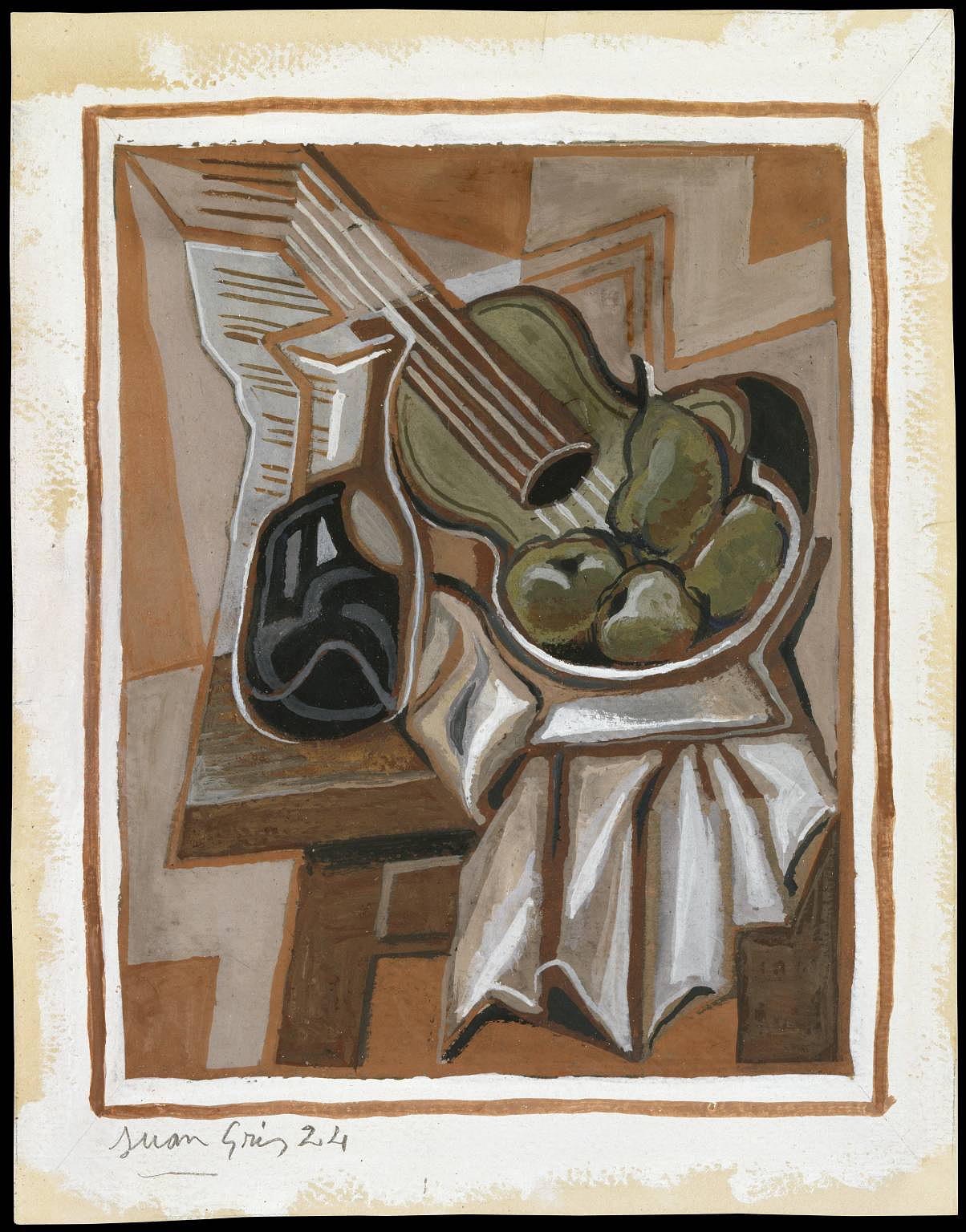Noughting

Juan Gris: Nature morte cubiste à la guitarem (1924)
"I find that tension thrilling …"
I'm not just a songwriter, but also somewhat of a guitarist. Not the kind commonly seen accompanying jazz bands, fretting hand all over the neck, fingers impossibly limber, intimately familiar with a hot half-dozen forms for even the most intimidating chords in every key. I use my guitar rather more defensively. It stands between me and my audience, a wooden fence I hide behind. I do okay but aspire to play no better. I accompany myself and I struggle wherever I attempt to get too fancy. I think of myself as primarily a lyricist, certainly much more than a guitarist. I'm a single acoustical act because I'm really not fit to play with anybody else. I keep my own tempos. I play exclusively my own songs. Consequently, I might be the only one who knows how to play along or when I play one wrong.
I became a curious kind of performer, one who'd always much rather not be the center of anyone's attention. A deep introvert, I nonetheless gravitated toward perhaps the most publicly visible profession. I understand that most professional performers tend to also be deep introverts. We're acting out of what's labeled our fourth function, that anything-but-that response to normal life tensions. We become our opposite under pressure and often seem the very soul of extroversion. It's all diversion, we're quaking up there, cowering behind the guitar as if it rendered us somehow invulnerable. My guitar, a remarkable 1967 Martin D-18, a "Dreadnought" series instrument, protects me whenever I perform. Named after a class of battleship its design resembles, it's big boxed. Of course, I must respect it by practicing up and properly playing it. Under unpracticed hands, it's capable of betraying who I fear I might really be. One must be worthy for its magic to come.
The Dreadnought guitars were designed to produce more sound than the then standard parlor jobs. They were bigger-bodied and originally intended for playing Hawaiian music with a steel slide. Folk musicians later adapted them and created something later labeled bluegrass, with its characteristic walking base line and fine string picking. Folk musicians adopted them for strumming, then folk-rock bands used them for fore- and background effects. Eventually, even electric musicians came to embrace Unplugged as a genre. I, myself, never plugged in. I think of my Dreadnought as my protection. It gives me no good reason to dread anything when I'm playing it. It is my rock when I perform.
I felt as though I'd arrived the day I acquired that guitar. I bought it with wages I'd earned washing pots in a hotel basement, one of the better jobs I ever held because it enabled me to be the songwriter and performer I'd aspired to become. I could work that mindless job, noodling over lyrics while scrubbing, working to my own rhythms, then feel free to stay up half the following night writing. My Dreadnought was my constant companion. I'd sit on the couch, scratchpaper spread out on the coffee table before me, and compose, secure, making joyful noises.
I would wish that every professional carried a Dreadnought with them, to lend them courage and reassurance. Perhaps each does, after their fashion, but I've always considered myself especially fortunate to own a defense so aptly named. I know that I have nothing to dread when I'm playing that damned thing, the finest available anywhere in the world, easily as storied as any Steinway piano. I recognize that it, too, has been sidelined too long and that I still have much hard work to finish before I can credibly perform with it again. If I feed it, it will protect me, though, from the inherent embarrassment performing always threatens. I find that tension thrilling, that sense that I could spectacularly fail in front of everybody, with only my magnificent guitar there Noughting to protect me.
©2022 by David A. Schmaltz - all rights reserved


